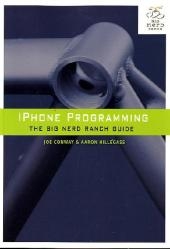
iPhone Programming
Big Nerd Ranch Guides (Verlag)
978-0-321-70624-9 (ISBN)
- Titel erscheint in neuer Auflage
- Artikel merken
Dynamic interfaces with animation
Using the camera and photo library
User location and mapping services
Accessing accelerometer data
Handling multi-touch gestures
Navigation and tabbed applications
Tables and creating custom rows
Multiple ways of storing and loading data: archiving, Core Data, SQLite
Communicating with web services
ALocalization/Internationalization
"After many 'false starts' with other iPhone development books, these clear and concise tutorials made the concepts gel for me. This book is a definite must have for any budding iPhone developer." –Peter Watling, New Zealand, Developer of BubbleWrap
Joe Conway, iPhone instructor for The Big Nerd Ranch, has been writing software on the Mac platform since he was a teenager, and began consulting and training for The Big Nerd Ranch shortly after graduating from the University of Wisconsin. Aaron Hillegass, CEO of Big Nerd Ranch, has more than 18 years of experience as a software engineer and developer trainer. He wrote the Big Nerd Ranch course on Cocoa, drawing from his experiences working at Apple and NeXT as senior trainer and curriculum developer. He is author of Cocoa Programming for Mac OS X (Addison-Wesley), the definitive guide to Cocoa programming.
Introduction
Prerequisites
Typographical Conventions
Hardware and Software
How to Use This Book
Learning is not Fun
Chapter 1: Simple iPhone Application
Creating an Xcode Project
Using Interface Builder
Model-View-Controller
Declarations
Declaring instance variables
Declaring methods
Making Connections
Setting pointers
Setting targets and actions
Summary
Implementing Methods
Event-driven Programming
Deploying an Application
Application Icons
Default Images
Chapter 2: Objective-C
Objects
Instances
Creating an instance
Sending messages
Destroying an instance
Writing the RandomPossessions Tool
NSArray and NSMutableArray
Subclassing an Objective-C Class
Instance variables
Accessors and properties
Instance methods
Initializers
self
super
Initializer chain
Class methods
Exceptions and the Console Window
Objective-C 20 Additions
Chapter 3: Memory Management
Memory Management Concepts
Managing memory in C
Objects and memory management
Reference Counting
Using retain counts
Avoiding memory leaks with autorelease
Managing memory in accessors and properties
Retain count rules
Managing Memory in RandomPossessions
Chapter 4: Delegation and Core Location
Delegation
Beginning the Whereami Application
Using frameworks
Core Location Service
Receiving Updates from CLLocationManager
For the More Curious: Compiler and Linker Errors
For the More Curious: Protocols
Challenge: Heading
Chapter 5: MapKit and UITextField
Object Diagrams
MapKit Framework
Interface Properties
Being a MapView Delegate
Your Own MKAnnotation
Tagging Locations
Renaming an Application
Challenge: Annotation Extras
Challenge: Reverse Geocoding
Chapter 6: Subclassing UIView
Creating a Custom View
The drawRect: Method
Instantiating a UIView
Drawing Text and Shadows
Using UIScrollView
Zooming
Hiding the Status Bar
For the More Curious: Retain Cycles
For the More Curious: Redrawing Views
Challenge: Colors
Chapter 7: View Controllers
Using View Controllers
Creating the UITabBarController
Creating View Controllers and Tab Bar Items
Creating Views for the View Controllers
viewWillAppear:
The Lifecycle of a View Controller
For the More Curious: Paging
Challenge: Map Tab
Chapter 8: The Accelerometer
Setting Up the Accelerometer
Getting Accelerometer Data
Orientation and Scale of Acceleration
Using Accelerometer Data
Smoothing Accelerometer Data
Detecting Shakes
Challenge: Changing Colors
Chapter 9: Notification and Rotation
Notification Center
UIDevice Notifications
Autorotation
Forcing Landscape Mode
For the More Curious: Overriding Autorotation
Challenge: Proximity Notifications
Chapter 10: UITableView and UITableViewController
Beginning the Homepwner Application
UITableViewController
Subclassing UITableViewController
UITableView's Data Source
UITableViewDataSource protocol
UITableViewCells
Reusing UITableViewCells
Next Steps for Homepwner
Challenge: Sections
Chapter 11: Editing UITableViews
Editing a UITableView
Begin and End Editing
Deleting Rows
Moving Rows
Inserting Rows
Chapter 12: UINavigationController
UINavigationController
UINavigationBar
An Additional UIViewController
The XIB File and File's Owner
Setting Up ItemDetailViewController
Navigating with UINavigationController
Appearing and Disappearing Views
Challenge: Number Pad
Chapter 13: Camera
ImageCache: a Singleton
NSDictionary
Singletons
UIImageView
Giving Possessions an Image
UUIDs
Dismissing the Keyboard
Challenge: Removing an Image
Chapter 14: Saving and Loading
Application Sandbox
Archiving
Writing Other Data to Disk
More on Reading and Writing to Disk
Challenge: Archiving Wherewasi
Chapter 15: Low Memory Warning
Low Memory Warning
Handling Low Memory Warnings
Be Careful
Simulating Low Memory Warnings
Chapter 16: UITableViewCell
Subclassing UITableViewCell
Image Manipulation
Archiving the Thumbnail Data
Challenge: Accessory Views
Challenge: Making it Pretty
Chapter 17: Multi-Touch
Create a Drawing Program
Touch Events
The Responder Chain
Instruments
The ObjectAlloc Instrument
The Sampler Instrument
For the More Curious: UIControl
For the More Curious: Touch Dependancy
Challenge: Saving and Loading
Challenge: Circles
Chapter 18: CALayer
Creating a CALayer
Layer Content
Implicitly Animatable Properties
For the More Curious: Programmatically Generating Content
For the More Curious: Layers and Views
Challenge: Dynamic Layer Content
Chapter 19: CAAnimation
Spinning the Time with CABasicAnimation
Timing Functions
CAKeyframeAnimation
For the More Curious: Presentation and Model Layers
Challenge: More Animation
Chapter 20: Media
The MediaPlayer Application
Playing System Sounds
Playing Audio Files
Playing Movie Files
Low-level APIs
Challenge: Audio Recording
Chapter 21: Web Services
The RandomNumbers Application
Fetching data from a URL
Parsing XML
For the more curious: The Request Body
For the more curious: Credentials
Challenge: Cancel Fetch
Chapter 22: Address Book
The People Picker
Additions to Possession Class
Address Book Functions
For the More Curious: That Other Delegate Method
Chapter 23: Localization
Internationalizing Homepwner
NSLocale
Localized Resources
Strings Tables
For the More Curious: NSBundle
Chapter 24: Bonjour
Publishing a Service
Browsing for Services
TXT Record
For the More Curious: Socket Connections
Chapter 25: Settings
Settings Bundle
NSUserDefaults
Registering Defaults
Using the defaults
Chapter 26: SQLite
What Am I doing?
The Interface
Making the database
Fetching
Making and Using the Tree
Challenge: Fetching more Data
Chapter 27: Core Data
Inventory
Edit the Model File
AppController
LabelSettingViewController
LocationListViewController
AssetListViewController
CountViewController
How it Works
Trade-offs of Persistence Mechanisms
Challenge: Deleting
Chapter 28: OpenGL ES
Setting up an OpenGL ES Project
Creating an OpenGL ES Capable View
Creating the EAGLContext
Frame and Render Buffers
Creating the Timer
The Rendering Method
The Rendering Controller
Rendering Shapes in OpenGL ES
Start and Stop Animation
| Verlagsort | Indianapolis |
|---|---|
| Sprache | englisch |
| Maße | 253 x 180 mm |
| Gewicht | 836 g |
| Themenwelt | Informatik ► Weitere Themen ► Smartphones / Tablets |
| Technik ► Nachrichtentechnik | |
| ISBN-10 | 0-321-70624-2 / 0321706242 |
| ISBN-13 | 978-0-321-70624-9 / 9780321706249 |
| Zustand | Neuware |
| Informationen gemäß Produktsicherheitsverordnung (GPSR) | |
| Haben Sie eine Frage zum Produkt? |
aus dem Bereich


